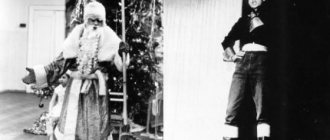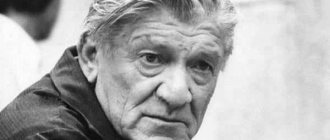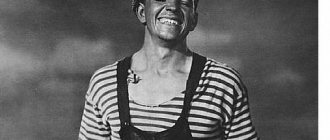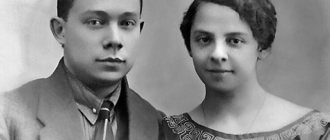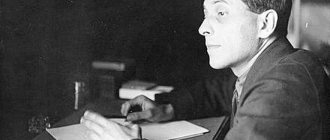Childhood
Nikolai Leskov was born on February 16, 1831. Circumstances were such that the village of Gorokhovka, located in the Oryol province, became the place of his birth.
It was here that his mother visited rich relatives. The boy spent the first eight years of his life with them. The tradition of staying for such a long time was quite normal in those days.
The father of the future writer was seriously planning to connect his life with the clergy, but as a result he changed direction and by the time his son appeared, he was serving in the criminal chamber. It was this service that gave him the right to a noble title in the future. Leskova’s mother came from a noble family, but her father became poor and could not provide his daughter with a decent dowry.
After the father’s quarrel with his superiors and his dismissal from service, the family moved to the Panino farm. By that time, Nikolai already had two brothers and two sisters, and he himself was finally taken away from his relatives.
It was at his new place of residence that Leskov first saw folk life. He spent many days observing the work and leisure of the peasantry, becoming imbued with their life, views and hopes. The boy’s father contributed to this by doing hard work on the land himself: he sowed grain, worked at the mill, and tended the garden.
Biography of Nikolai Semenovich Leskov - early years.Russian writer Nikolai Semenovich Leskov was born on February 16, 1831, this happened in the Oryol province in the village of Gorokhovo, where his mother was visiting rich relatives.
Nikolai’s maternal grandmother also lived here. Leskov’s paternal ancestors were from the clergy: Nikolai Semenovich’s father, grandfather, and great-grandfather served as priests in the village of Leska in the same province. It was from the name of the village that the surname of Nikolai Semenovich Leskov came from. The father of the famous writer Semyon Dmitrievich Leskov worked as a noble assessor in the Oryol Chamber of the Criminal Court, where he received the nobility. The mother of the writer-ethnographer Marya Petrovna Alferyeva came from a noble family of the Oryol province. Nikolai Leskov lived in the house of maternal relatives of the Strakhovs in Gorokhov until he was eight years old. Besides him, six more children lived there - Nikolai’s cousins. Russian and German teachers, as well as a French woman, were invited for them. Since Nikolai was more gifted and more successful in studies than his brothers, he was disliked here, and he himself asked his grandmother to write a letter to his father so that he would take Nikolai from the village. So he began to live with his mother and father in Orel on the third noble street. After some time, the whole family moved to the Pagnino estate, the father was busy sowing crops, looking after the garden and the mill. When Nikolai was ten years old, he was sent to study at the provincial gymnasium in the city of Orel. Studying was easy for the future writer, but after five years of study, he was given a certificate instead of a certificate, since Nikolai Leskov did not want to take the re-examination in the fourth grade. After these events, it became impossible to continue studying here, and Nikolai’s father assigned him as a scribe to the Oryol Criminal Chamber. Nikolai’s biography contains information that at the age of seventeen and a half he became an assistant to the head of the Oryol Criminal Chamber. Around the same time in 1848, his father died, and S.P., a professor at one of the Kyiv universities and therapist, volunteered to take part in the further fate of Nikolai Leskov. Alferyev is the husband of his maternal aunt. A year later, Nikolai Semenovich Leskov moved to Kyiv with him, where he began working in the Kyiv Treasury Chamber as an assistant to the chief clerk in the recruitment desk of the audit department. For all his relatives and friends, Nikolai’s decision to get married was unexpected, despite requests from his relatives to postpone it. His chosen one was the daughter of a wealthy Kyiv businessman, but a few years later the couple began to move away from each other due to differences in tastes and interests. And after the death of their first-born Mitya, their relationship became completely nonexistent, and in the early sixties, Nikolai Leskov’s marriage practically fell apart. In 1853, Nikolai was promoted to collegiate registrar, at the same time he was appointed to the post of mayor, and three years later he became provincial secretary. In 1857, Leskov began to serve as an agent in a private company, the head of which was A.Ya. Schcott, an Englishman who married Leskov’s aunt, was a manager on the estates of Naryshkin and Perovsky. On the affairs of these officials, Leskov often had to make various trips in which he could carry out his observations. The company's activities allowed Leskov to visit many places as a representative of the company. Biography of Nikolai Semenovich Leskov - mature years.
At the end of these wanderings around Russia, which lasted three whole years, Nikolai Semenovich Leskov began to engage in writing, and from that moment his biography changed greatly. The year 1860 brought fame to several of his articles, which were published in such publications as “Economic Index”, “Modern Medicine”, “St. Petersburg Gazette” and other sources. At the beginning of his literary career, Leskov chose the pseudonym M. Stebnitsky, after some time he began to publish under various pseudonyms - Nikolai Gorokhov, V. Peresvetov, Freishitz, Psalmist, Nikolai Ponukalov, Man from the Crowd, Watch Lover and under other equally well-known names . In 1861, Nikolai Leskov moved to St. Petersburg, and in the spring of the same year he published the article “Essays on the Distillery Industry” in Otechestvennye Zapiski. A year later, in the newspaper “Northern Bee,” which considered Leskov one of the most talented employees, he published a piquant article under the pseudonym Stebnitsky on the issue of the fire in the Shchukin and Apraksin courtyards. The article blamed the arsonists, whom the people considered nihilistic rebels, and also accused the government of failing to put out the fire and catch the criminals. Opinions began to spread that Nikolai Leskov considered the fires in St. Petersburg and the revolutionary aspirations of students to be interconnected things, and, despite the fact that the writer gave public refutations of these rumors, his name became the subject of numerous suspicions. After this, the famous writer went abroad, where he began to create his famous novel “Nowhere,” in which he reflected the movements of the sixties in the most negative light. The first few chapters of the novel were published at the beginning of 1864 in the publication “Library for Reading”, thanks to them the author gained not the most positive fame, since no one dared to write such things. In 1874, Leskov was appointed a member of the educational department in the Scientific Committee under the Ministry of Public Education, the main function of this department was the study of books intended for the people. Three years later, Empress Maria Alexandrovna gave a positive review to Nikolai Leskov’s work “The Soborians,” thanks to which he became a member of the Educational Department at the Ministry of State Property. A few years later he left this position, and in 1883 he was fired from the Ministry of Public Education, which he was incredibly happy about. Leskov’s biography says that the famous writer died on March 5, 1895 in St. Petersburg; the cause of death was an asthma attack, from which he had suffered over the past few years.
See
all the portraits here
©
Biography of Nikolai Semenovich Leskov.
Studies
Leskov grew up as a very smart and quick-witted boy. Therefore, it turned out to be very strange that his studies at the Oryol gymnasium did not work out. The boy was able to complete only two classes, given that he spent five years in the educational institution.
Many literary scholars argue that he was not interested in studying or memorizing texts. But there is a lot of evidence that, being very active and temperamental, Leskov simply did not know how to follow school rules and was constantly in conflict with teachers.
Be that as it may, the young man went free and had to somehow arrange his life.
Service
Leskov's adult life began with the help of his father. He placed his son in the criminal chamber, in which he served himself and where he still had friends. However, the prosperity did not last long.
In 1848, the young man's father died of cholera. Almost all of the family's property was burned in the fire. Nikolai was just over 17 years old when his uncle, a professor, encouraged him to move to Kyiv and obtain the position of an official in the treasury chamber. Soon the future writer rose to the rank of chief clerk.
Life in Kyiv led to the fact that the young man, with all the fervor of youth, began to study Ukrainian culture. He was interested in absolutely everything: literature, art, painting, and architecture.
In 1857, Nikolai Semenovich decided to radically change his life. He left the service and went to work for an agricultural company, which was headed by his English uncle (the husband of his mother's sister). As the writer himself says, it was a wonderful opportunity to see the world, which was used in those days by many who were eager to travel, but were unable to pay for them.
For three whole years, Leskov traveled around Russia, carrying out orders for the company, but in fact eagerly studying his native country and the life of its people. He managed to visit most of it and collect enormous observational material, which he would never have been able to do while sitting in a dusty office. His voyage was interrupted in 1860 due to the closure of the company. Leskov returned to Kyiv.
Celebrating the 300th anniversary of the reign of the House of Romanov
Discussion: 7 comments
- Vadim Vinogradov:
02/17/2007 at 00:00It’s so good that you revealed this period of N.S. Leskov’s delusion. What an example of how difficult it is to hold true faith! The author of “Soboryan”, the author of the catchphrase, which even today is directly addressed to the Sergians: “Keeping the dead letter... they are here... Destroying God’s living work”... and suddenly, like Laurita today, he turns 180 degrees to what he professed yesterday.
- Lada Grigorieva:
02/17/2007 at 00:00
Perhaps, just as Tolstoy became especially aggressive towards Orthodoxy, after taking lessons in ancient languages and studying biblical texts that the rabbi read to him, perhaps Leskov was influenced...
- Valerian, Lutheran and Russian intellectual:
03/11/2008 at 00:00
What bestiality and Hitlerism we have fallen to. Lord save Rus'!
- BOER:
03/11/2008 at 00:00
You Lutherans have fallen long ago. It’s not for you to save our Rus'.
- Anya:
02/15/2009 at 00:00
few pictures and photographs
- Nikolai:
08/17/2017 at 00:00
Let’s not lie, the author indicated the significance of N.S.’s work. Leskov "The Jew in Russia". One should be more careful in assessing the work of such a first-class writer. The story “Ear Without Fish” by N.S. Leskov has not yet been republished. Why? But the work “The Jew in Russia” was published, studied and discussed by forest scientists. Leskov is the genius of the Rusak nation. Read Leskov and build Holy Rus' - the Russian Republic. Moscow is the capital of the Rusak.
- Nikolay:
08/17/2017 at 00:00
Leskov is the genius of the Rusak nation. Leskov never belittled Orthodoxy. All his work is permeated with the ideas of Orthodoxy. Admirers of his work should be more attentive to his legacy. Leskov knew the Talmud, the Bible and other primary sources on the religions of the world, so he could not turn away from the true path. Leskov was not mistaken, but was constantly searching and in search. So kindly judge him more fairly. Study letters, articles, all stories, etc. Love Leskov. After all, according to Leontyev, Leskov is a truly Orthodox writer.
Creation
Upon his return, Leskov began writing essays for various magazines. His works are successful. He decides to connect his future life with literary creativity and moves to St. Petersburg.
Having become an employee of the popular newspaper “Northern Bee”, Leskov again had the opportunity to travel. This time the geography of his wanderings was not limited to his homeland. The writer visited Poland, the Czech Republic and Western Ukraine. Everywhere he sought to study local life, history, and culture as deeply as possible.
Returning to his homeland, he plunges headlong into creativity. For the first time he begins to write stories and novellas: “The Extinguished Affair”, “Lady Macbeth of Mtsensk District”, “The Life of a Woman”. The first novels also came from his pen: “Nowhere”, “Bypassed”, “On Knives”.
Leskov’s views in most cases diverged from the official opinion of the state, so he was practically not published anywhere. The only magazine in which his works were published was Russian Messenger. But even here they were subject to merciless censorship.
In 1881, one of the writer’s most famous stories, “Lefty,” was written.
In 1984, he created his last story, “The Hare Remise.” Unfortunately, it was filled with criticism of the country's political system, so it was released only after the 1917 revolution.
Confession
Despite his rich literary creativity, Leskov went down in history as the creator of the famous story “Lefty”. It is based on the legend about the skill of the gunsmiths of that time. In the story, the scythe master Lefty managed to skillfully shoe a flea.
The writer’s last large-scale work was the story “The Hare Remise.” It was published in 1894. But since it was based on criticism of the political structure of Russia at that time, the story could only be published after the October Revolution of 1917.
The writer’s personal life was not entirely successful either. His first wife Olga Smirnova suffered from a mental disorder, and his first-born son died young. Life did not work out with his second wife Ekaterina Bubnova, with whom he separated after 12 years of marriage.
The writer died of asthma on February 21, 1895. He was buried in St. Petersburg at the Volkovskoye cemetery. And today, admirers of the writer’s talent can honor his memory at his grave.
Personal life
Leskov’s personal life cannot be called successful. In 1853, he married for the first time, despite the fact that his relatives dissuaded him from this step. His wife was Olga Smirnova.
Perhaps they would have been happy, but the death of their first child, Mitya’s son, crippled the young wife. Even the birth of the girl Varya did not save her from a mental disorder and long treatment. As a result, the marriage broke up.
Leskov decided to remarry only in 1865. But this marriage did not last long. After the birth of their son Andrei and thirteen years of marriage, the couple finally separated. The writer never tied the knot again.
Leskov died in 1895 and was buried at the Volkov cemetery in St. Petersburg.


